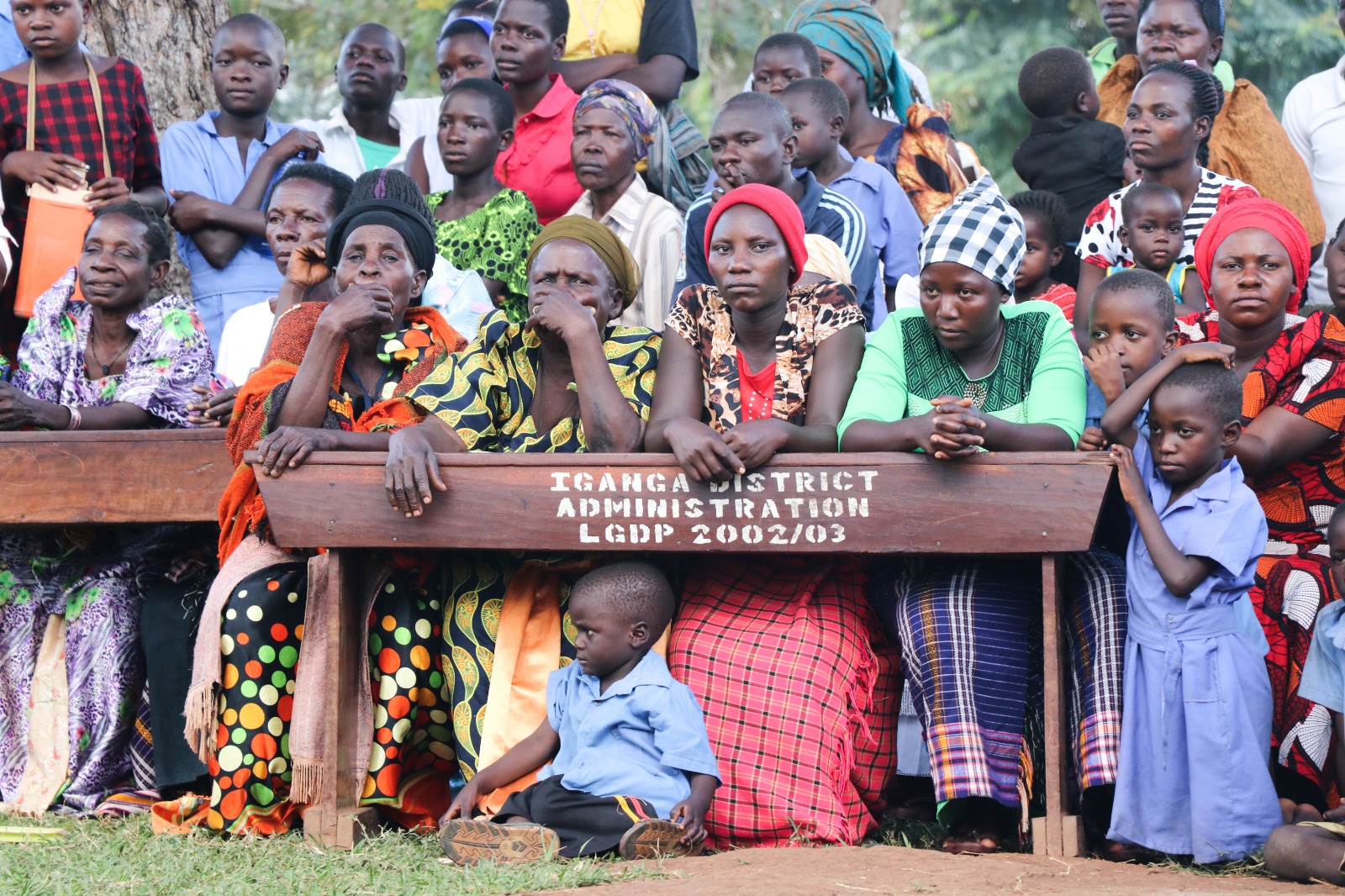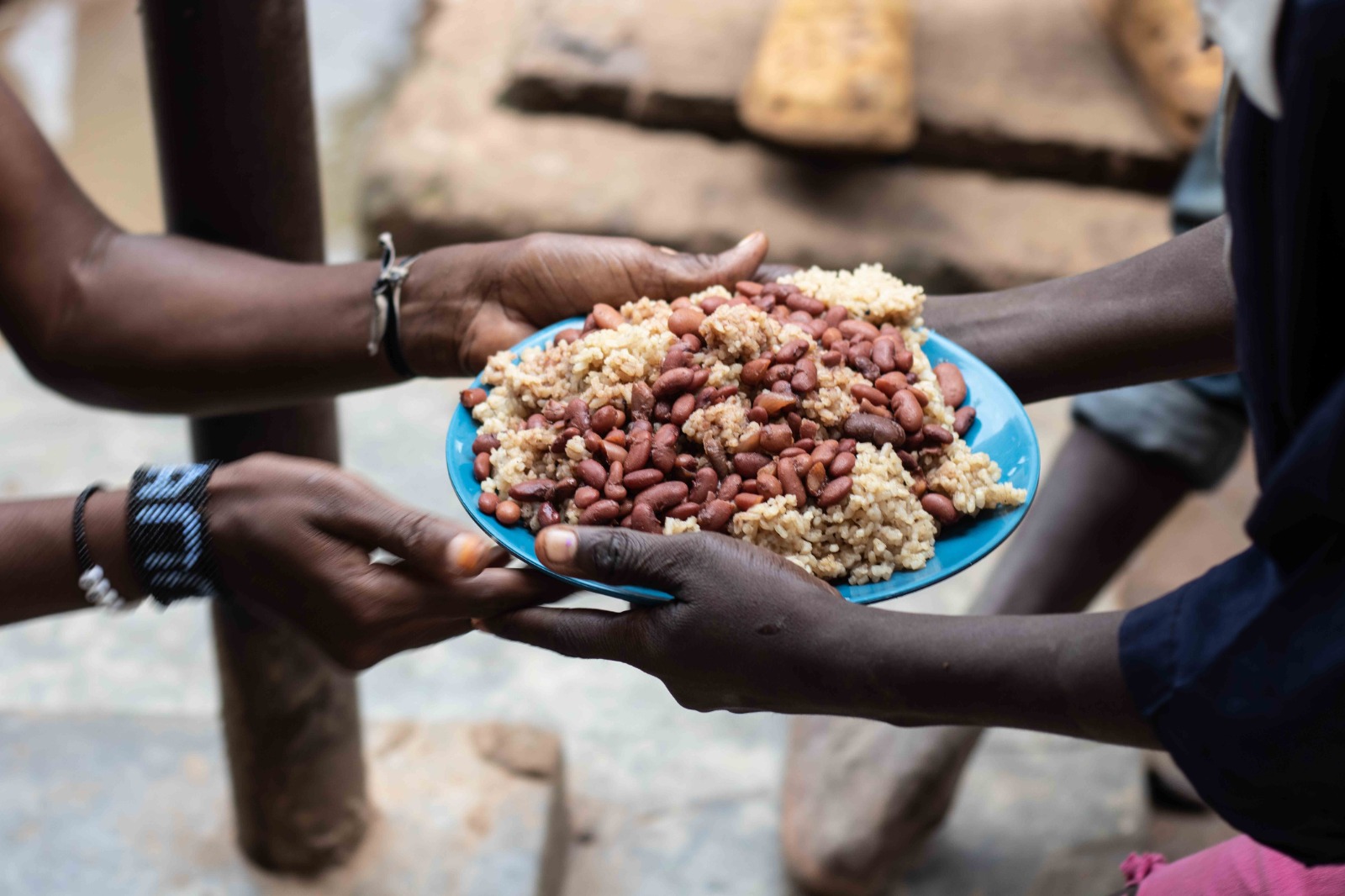Deborah Mutesi: “Las mujeres somos las madres de la nación”
“Dándonos responsabilidades traeremos la equidad de género.”
3 de noviembre de 2019

Acto comunitario en el distrito de Luuka. / Luuka, mayo 2019
Foto: Txell Prats
OS PUEDE INTERESAR…
EL COMPLEJO DEL BLANCO SALVADOR – Lee nuestro artículo sobre este fenómeno.
AUTOR/A
Deborah Mutesi Christine es la coordinadora de Gomesi, uno de los proyectos de Petits Detalls. Dirige la contraparte local WIPE (Women’s Initiative for Poverty Erradication), que trabaja para el empoderamiento de la mujer rural en Uganda desde hace años.
En Uganda, como en la mayor parte del mundo, los derechos de las mujeres son violados cada día. En este país los estragos de una sociedad patriarcal y machista se agudizan en las comunidades rurales.
Deborah nació en el seno de una familia en una zona rural de Jinja, Uganda. Siempre nos cuenta que desde pequeña destacaba por su inquietud e inconformismo respecto a la situación de las mujeres en su comunidad y, por ello, creó el proyecto Gomesi, a través del cual da apoyo a más de 900 mujeres anualmente para lograr independencia económica y acabar con la violencia de género que muchas de ellas viven a diario.
¿Es la violación de derechos de la mujer algo cultural?
En parte es cultural, pero también tiene una vertiente social y religiosa.
Si partimos de la idea de cómo son vistas las mujeres aquí, debemos tener presente que gran parte de la comunidad estigmatizaría a un grupo de ellas sentadas a la sombra de un árbol hablando. Todo el mundo pensará que está mal, que están “haciendo el cotilla”. Da igual de lo que hablen, su derecho a asociarse es el primero en ser vulnerado.
Por otro lado, hay demasiados matrimonios forzosos y precios altos para vender a las novias como propiedades y, luego, si la pareja no puede tener hijos debido a un problema fértil, la culpa será de ella. No importa quién de los dos es infértil, el hombre podrá abandonar a la mujer y pedir que le devuelvan su dinero.
Con todo esto, lo que quiero decir es que no podemos justificar la violación de los derechos humanos diciendo que “forma parte de nuestra cultura”, porque es injusto y un gran error. Hay algunos aspectos que sí vienen dados por tradiciones, pero hay cientos de aspectos que son el resultado de una sociedad machista.
¿Por qué religiosa?
Es un tema delicado, hay mucha idealización de la iglesia y fanatismo religioso. Además, las religiones que imperan en este país son clásicas, no progresistas ni adaptadas a la realidad social actual. Las mujeres no pueden liderar las oraciones, algunas deben taparse por completo y a otras les prohíben ir con pantalón o falta corta. En este aspecto, los divorcios todavía ahora son un debate los domingos; una mujer no puede decidir por sí misma separarse y, si lo hace, una vez más, la comunidad la estigmatizará. Esto conlleva matrimonios infelices donde la mujer no puede decidir.
¿Qué papel juega la educación en este aspecto?
No está escrito, pero ciertos niveles educativos están restringidos para la mujer. La Ley dice que todos somos iguales, pero en la zona rural, con 13 años ya eres objeto de matrimonio forzado o embarazo infantil.
Hay muchas mujeres que hemos tenido la suerte de estudiar una carrera, un máster, llegar a lo más alto, pero nuestro camino es 10 veces más difícil, porque ni la familia, ni los profesores, ni la comunidad, creerán que tu papel en la sociedad es el de aportar conocimiento, experiencia o profesionalismo. La mujer es el sexo débil, buena para el trabajo en casa, tener hijos, criarlos e ir al campo a cultivar, así es como te ven y lo que esperan de ti.
Y esto lo has vivido en tus propias carnes…
Exacto.
A lo largo de mi vida, han sucedido muchas cosas que despertaron en mi el sentimiento de ser inferior a los hombres de mi comunidad. Por ejemplo, cuando mi padre murió. Tradicionalmente, las tierras que tus familiares poseen se reparten entre los hijos cuando los padres fallecen. Yo soy la hija mayor, por lo que era la heredera directa, pero los líderes de mi clan nos denegaron las tierras a mi y a mis hermanas por ser mujeres.
Ya de mayor, en uno de mis primeros puestos de trabajo, rechazaron que yo pudiera tener un sueldo equivalente al de un hombre en la misma posición y con la misma experiencia que yo. ¡Por ser mujer! Y hay quienes no tienen escrúpulos en decirlo.
Son solo dos situaciones, pero de manera personal esto me ayudó a ver y comprender la sociedad en la que vivimos. Por ello empecé el proyecto Gomesi, para promocionar que mujeres como yo, pero sin la suerte de tener una carrera universitaria, puedan ser independientes, empiecen sus propios negocios y rompan con las reglas que se nos imponen.
¿Cómo puede ayudar a una mujer la independencia económica?
Si tienes tu propia fuente de ingresos nada te puede parar. Muchas de nosotras abandonamos los estudios de jóvenes, forzadas a casarnos, a cumplir con nuestros roles de mujer. Sin estudios y sin un trabajo digno, es fácil caer en una relación de dependencia económica.
Con tu propia economía puedes tomar tus propias decisiones sin tener que estar sometida a tu pareja. Empoderando a las mujeres económicamente ayudas a que mejoren sus estándares, reduces la pobreza y también implica un impacto directo en los hijos y las hijas.
Empoderando a una mujer, empoderas a una nación…
Sí. Las mujeres y madres son las personas que cuidan y educan a las futuras generaciones, pues ser madre también es un rol principal que adoptamos las mujeres en Uganda.
Cuando a una mujer le das herramientas, formación y la expones a debates sobre sus derechos, la estás haciendo más independiente en sus decisiones. Esto implica que todo lo que pase por sus manos, tendrá un impacto para ella muy positivo, pero, además, será un impacto directo en las futuras generaciones y en la futura nación.
Es por todo esto que necesitamos mujeres líderes en nuestras comunidades, somos las madres de la nación y dándonos responsabilidades traeremos la equidad de género que nos asegurará un desarrollo sostenible para nuestro país.
In Uganda, like in most places around the world, women’s rights are being violated every day. The patriarchal and misogynist society’s toll in this country worsens in rural areas.
Deborah was born in the bosom of a family from Jinja’s rural area, in Uganda. She’s always telling us that from an early age she stood out for her restlessness and inconformity regarding the women’s standing in her community. That’s why she started the Wipe-Gomesi project, which supports more than 900 women annually to achieve financial independence and stops the domestic violence many of them suffer daily.
Is the violation of women’s rights a cultural problem?
Partly it is a cultural issue. But it is also a social and religious aspect.
It stems from how women are perceived here. A group of them siting under a tree’s shade is already a stigma for the whole community. Everybody will think they are badmouthing and gossiping, which is frowned upon here. Regardless of their actual conversation subject, their right to assembly is the first one that’s infringed.
Infertility is another issue. First, there are many forced marriages and high bride prices to render women as a property, then if the couple can’t produce a kid, the blame is mostly for women. Man can chase away the wife without even inquiring whether who can’t produce.
What I mean is that we can’t justify the violation of women’s rights by saying its part of our culture, that’s unfair and a mistake. There are some aspects that come with culture but there are hundreds of them that are the result of a male chauvinist society and not part of any culture in the world.
Why religious?
It’s a delicate issue, there’s a lot of idealization of the church and religious fanaticism; furthermore, the religions that reign this country are traditional, they aren’t progressive nor adapted to our current social reality. Not being able to lead prayers, hiding women’s bodies, not wearing shorts… In this aspect, divorce is still a contentious subject on Sundays, a woman can’t decide for herself to separate her spouse and, if she does, once again, she will be stigmatized by the community. This leads to unhappy marriages where the woman can’t choose freely.
What role does education have in this context?
It’s not written down, but women are hindered past a certain educational level. The Law says we are equal, but in rural areas, if you are 13 you’re subject to force marriage o child pregnancy.
There’s a lot of women that have been lucky to study a degree, a master’s degree, to reach the top. But our path has been 10 times more difficult, because not your family, nor your teachers or community believe that your role in society is to contribute knowledge, experience, professionalism… Women are the inferior sex, she’s good for doing house chores, having children, raise them and work in the garden. This is how they see you and what ‘s expected of you.
And you have first-hand experience of this…
Exactly.
In a personal level, many things woke within me a sense of inferiority to the men in my community. One left an impression on me, when my dad died. Traditionally, the land your family has is divided between the children once the parents die. I’m the eldest child, hence I’m the direct heir, but the leaders of my clan denied my sisters and me the land because we are women and it’s considered that we are not part of any clan but the one for our husbands.
When I was older, in one of my first jobs, they denied me the same salary as a man with the same position and experience as me. Because I’m a woman! And there’re people that don’t have any scruples in telling you that.
Those are only two examples, but in a personal level this helped me to see and comprehend the society we live in. That’s why I started the Gomesi project, to promote women that didn’t have the fortune to get a college degree to be independent, to start their own business and to break the rules that are imposed on us.
How can financial independence help a woman?
If you have your own income, nothing can stop you. Many of us drop out of school when we are young, forced to marry, to adopt the woman’s role. Without studies and lacking a decent job it’s easy to fall into a relation where you are financial dependent on your partner.
With your own income you can take your own decisions without having to be put down by your spouse. Empowering women financially helps them better their standard of living, reducing overall poverty, which has a direct effect on their sons and daughters.
Empowering a woman, you empower a nation
Yes. Women and mothers are the ones that take care and rear future generations, because being a mother is another role we women adopt in Uganda.
When you give women tools, education and you expose them to debates about their rights, you are making them more independent in her decisions. This implies that everything that passes through her hands will have a great impact on her life, but, furthermore, it will directly affect future generations and the nation’s future.
And that’s why we need women leaders in communities, we are the mothers of the nation and by giving us responsibility we’ll bring gender equality which will ensure a sustainable development for our country.


